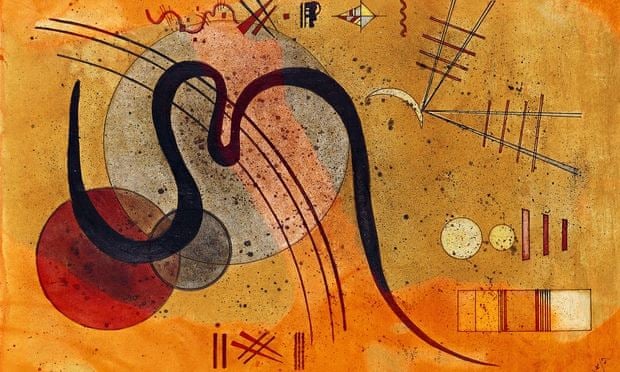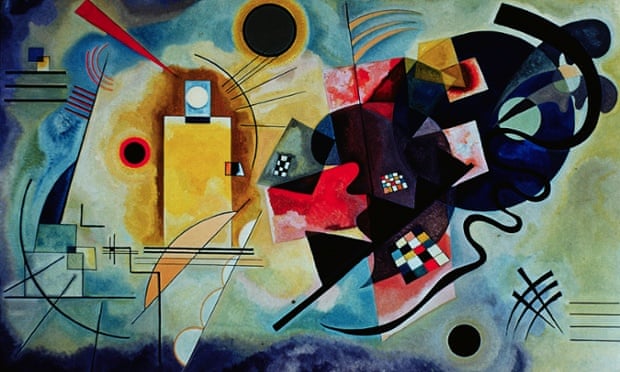The great abstract artist’s paintings are spiritual symphonies that
reveal hidden truths and speak directly to our senses and feelings
The fascinating thing about Wassily Kandinsky, whose 148th birthday has got him a Google Doodle today, is how seriously and carefully he evolved from figurative painting to abstract art. Kandinsky did not become an abstract painter lightly. He reached abstraction in a strenuous, thoughtful way that gives his art huge authority.
In his early expressionist paintings villages glow in radiant colours. These landscapes pulse with wild chromatic splendour that resembles the freedom of the fauves. In fact Kandinsky’s expressive landscapes are already partly abstract, in their use of colour. This innovation, that started with the French fauves and was rapidly adopted by the German expressionists, was the first, huge step towards abstraction in 20th-century art. But the wild colours enflaming art in the early years of the century still portray a very recognisable world. Kandinsky took it a revolutionary step further by reaching a logical conclusion – what if painting were pure colour? What if it created its own imaginary world, like the world of a symphony?
Like symphonies, Kandinsky’s great abstract paintings speak directly to
our senses and feelings. Their constellations of mysterious marks are
like waves of sound that trigger emotions. For him, the world they
pointed towards was a spiritual realm, a hidden truth.
Kandinsky and Piet Mondrian both build cathedrals of the mind in their abstract art – silent cities of spiritual calm. That mystical impulse is connected to mathematics, and in Kandinsky this means a deep consciousness of structure. If his paintings have the expressive colour of Van Gogh’s Starry Night they also have the classical clarity of Poussin.
There is a true grandeur to his concept of painting, and a sense of truth. Whatever we think about his spiritualist beliefs, the result is an art that is at once purely abstract and plainly rooted in a deep feel for the nature of things. A profound, paradoxical and rich achievement. Kandinsky intuits the cosmic complexity of modern physics. His art can be set alongside today’s images of the fabric of the universe.
None of this makes Kandinsky an easy artist.
It makes him a great one.
Read More
http://www.theguardian.com/artanddesign/jonathanjonesblog/2014/dec/16/wassily-kandinsky-148-google-doodle
 |
| Launelinie, 1927, by Wassily Kandinsky. Photograph: Christie’s Images/Corbis |
The fascinating thing about Wassily Kandinsky, whose 148th birthday has got him a Google Doodle today, is how seriously and carefully he evolved from figurative painting to abstract art. Kandinsky did not become an abstract painter lightly. He reached abstraction in a strenuous, thoughtful way that gives his art huge authority.
In his early expressionist paintings villages glow in radiant colours. These landscapes pulse with wild chromatic splendour that resembles the freedom of the fauves. In fact Kandinsky’s expressive landscapes are already partly abstract, in their use of colour. This innovation, that started with the French fauves and was rapidly adopted by the German expressionists, was the first, huge step towards abstraction in 20th-century art. But the wild colours enflaming art in the early years of the century still portray a very recognisable world. Kandinsky took it a revolutionary step further by reaching a logical conclusion – what if painting were pure colour? What if it created its own imaginary world, like the world of a symphony?
 |
|
|
Kandinsky and Piet Mondrian both build cathedrals of the mind in their abstract art – silent cities of spiritual calm. That mystical impulse is connected to mathematics, and in Kandinsky this means a deep consciousness of structure. If his paintings have the expressive colour of Van Gogh’s Starry Night they also have the classical clarity of Poussin.
There is a true grandeur to his concept of painting, and a sense of truth. Whatever we think about his spiritualist beliefs, the result is an art that is at once purely abstract and plainly rooted in a deep feel for the nature of things. A profound, paradoxical and rich achievement. Kandinsky intuits the cosmic complexity of modern physics. His art can be set alongside today’s images of the fabric of the universe.
None of this makes Kandinsky an easy artist.
It makes him a great one.
Read More
http://www.theguardian.com/artanddesign/jonathanjonesblog/2014/dec/16/wassily-kandinsky-148-google-doodle
No comments:
Post a Comment